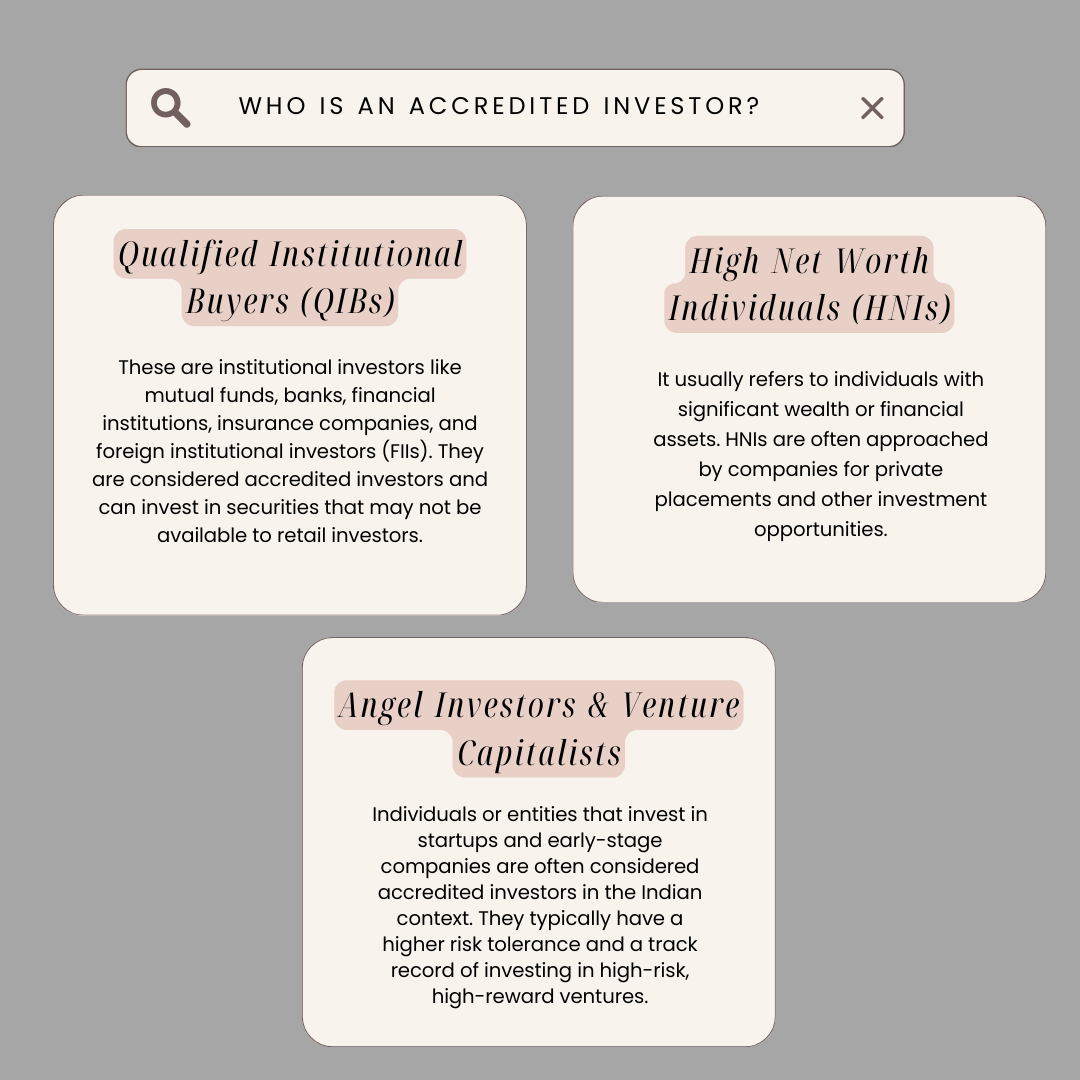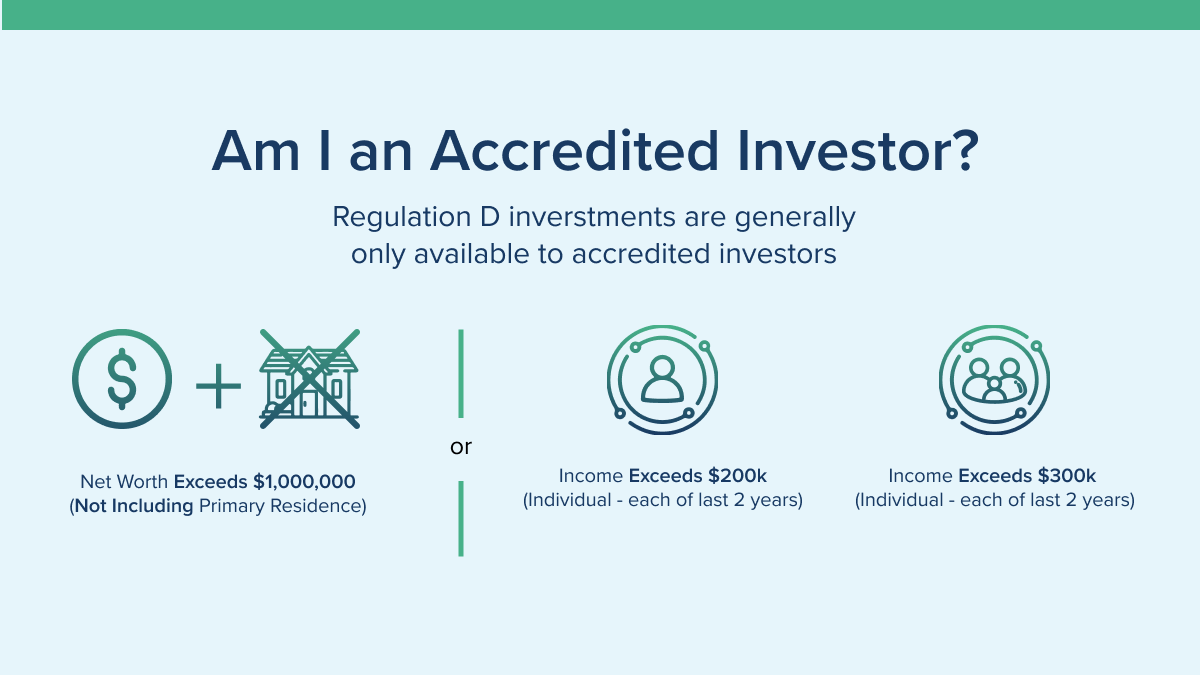All Categories
Featured
Table of Contents
As certified financiers, people or entities may partake in exclusive financial investments that are not signed up with the SEC. These capitalists are presumed to have the financial sophistication and experience called for to assess and invest in high-risk investment opportunities inaccessible to non-accredited retail financiers. Right here are a couple of to take into consideration. In April 2023, Congressman Mike Flood presented H (high yield investments for accredited investors).R
For now, investors should comply with the term's existing meaning. There is no official procedure or federal qualification to come to be a certified financier, a person might self-certify as a certified capitalist under present guidelines if they earned more than $200,000 (or $300,000 with a spouse) in each of the previous two years and expect the same for the existing year.
Individuals with an energetic Series 7, 65, or 82 license are also taken into consideration to be recognized investors. Entities such as corporations, partnerships, and trusts can additionally achieve accredited financier status if their financial investments are valued at over $5 million. As recognized capitalists, individuals or entities might partake in private investments that are not signed up with the SEC.
Private Equity (PE) funds have shown amazing growth in current years, seemingly undeterred by macroeconomic challenges. PE companies pool capital from certified and institutional investors to obtain controlling passions in mature exclusive firms.
In addition to resources, angel investors bring their specialist networks, advice, and experience to the start-ups they back, with the assumption of endeavor capital-like returns if the business takes off. According to the Center for Endeavor Research, the ordinary angel investment amount in 2022 was about $350,000, with investors receiving an ordinary equity risk of over 9%.
Proven Alternative Investments For Accredited Investors – Dallas
That said, the advent of online private credit platforms and particular niche sponsors has actually made the asset class easily accessible to private accredited investors. Today, investors with as low as $500 to spend can take advantage of asset-based personal credit opportunities, which use IRRs of approximately 12%. In spite of the rise of e-commerce, physical food store still make up over 80% of grocery store sales in the USA, making themand especially the real estate they run out oflucrative investments for accredited capitalists.
In contrast, unanchored strip facilities and neighborhood centers, the following two most heavily negotiated kinds of genuine estate, tape-recorded $2.6 billion and $1.7 billion in deals, specifically, over the same duration. What are grocery store store-anchored? Country strip malls, electrical outlet shopping malls, and various other retail facilities that feature a significant food store as the area's major tenant normally fall under this group, although shopping malls with encased walkways do not.
To a lesser level, this phenomenon is likewise true backwards. This distinctly symbiotic relationship in between a facility's renters drives up demand and keeps rents boosted. Certified investors can purchase these rooms by partnering with property private equity (REPE) funds. Minimum financial investments normally begin at $50,000, while complete (levered) returns range from 12% to 18%.
Experienced Accredited Crowdfunding – Dallas 75201 TX

The market for art is likewise expanding. By the end of the decade, this number is expected to approach $100 billion.
Capitalists can currently own diversified personal art funds or acquisition art on a fractional basis. secure investments for accredited investors. These alternatives come with financial investment minimums of $10,000 and use internet annualized returns of over 12%.

Over the past numerous years, the accredited capitalist interpretation has been slammed on the basis that its sole concentrate on an asset/income test has unfairly omitted almost the most affluent individuals from profitable financial investment opportunities. In action, the SEC started considering methods to increase this meaning. After an extensive comment duration, the SEC embraced these changes as a way both to catch people that have trustworthy, alternate indications of economic refinement and to modernize certain obsolete sections of the meaning.
The SEC's main concern in its law of non listed safety and securities offerings is the security of those capitalists that lack an adequate degree of monetary refinement. This worry does not relate to experienced staff members because, by the nature of their position, they have sufficient experience and access to monetary information to make educated investment decisions.
Leading 506c Investment
The figuring out variable is whether a non-executive staff member actually joins the private investment firm's financial investments, which should be established on a case-by-case basis. The enhancement of knowledgeable employees to the accredited capitalist meaning will certainly likewise permit more staff members to spend in their employer without the personal investment business risking its own condition as a certified investor.
Before the modifications, some personal investment firm took the chance of shedding their certified capitalist condition if they permitted their workers to buy the business's offerings. Under the modified definition, a higher number of personal investment firm employees will currently be qualified to invest. This not only creates an additional source of resources for the exclusive financial investment firm, however also additional lines up the interests of the staff member with their employer.
High-Quality Exclusive Investment Opportunities For Accredited Investors – Dallas
Currently, only people holding particular broker or economic advisor licenses ("Collection 7, Series 65, and Series 82") qualify under the definition, but the modifications provide the SEC the capacity to include added accreditations, classifications, or qualifications in the future. Specific kinds of entities have additionally been contributed to the interpretation.
When the meaning was last upgraded in 1989, LLCs were fairly unusual and were not consisted of as a qualified entity. Under the changes, an LLC is taken into consideration an accredited financier when (i) it has at the very least $5,000,000 in possessions and (ii) it has not been formed entirely for the specific objective of obtaining the securities provided.

Similarly, specific household offices and their clients have been included in the definition. A "family members workplace" is an entity that is developed by a household to handle its assets and offer its future. To make certain that these entities are covered by the meaning, the modifications mention that a family members workplace will now qualify as an accredited investor when it (i) takes care of at the very least $5,000,000 in properties, (ii) has actually not been developed especially for the function of acquiring the used securities, and (iii) is directed by a person that has the economic refinement to evaluate the qualities and threats of the offering.
The SEC asked for comments relating to whether the financial limits for the earnings and asset examinations in the interpretation need to be readjusted. These thresholds have actually remained in location given that 1982 and have actually not been gotten used to account for inflation or other elements that have altered in the stepping in 38 years. Nonetheless, the SEC ultimately decided to leave the property and earnings thresholds unmodified in the meantime.
Table of Contents
Latest Posts
Surplus Money
Online Tax Lien Investing
Tax Sales Lists
More
Latest Posts
Surplus Money
Online Tax Lien Investing
Tax Sales Lists